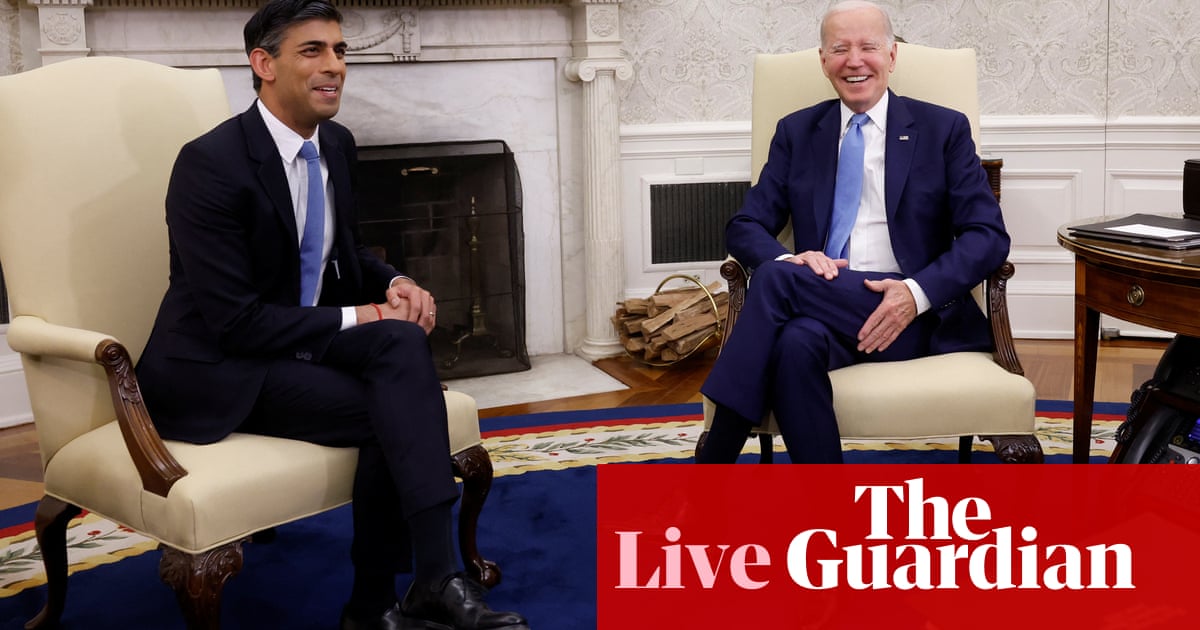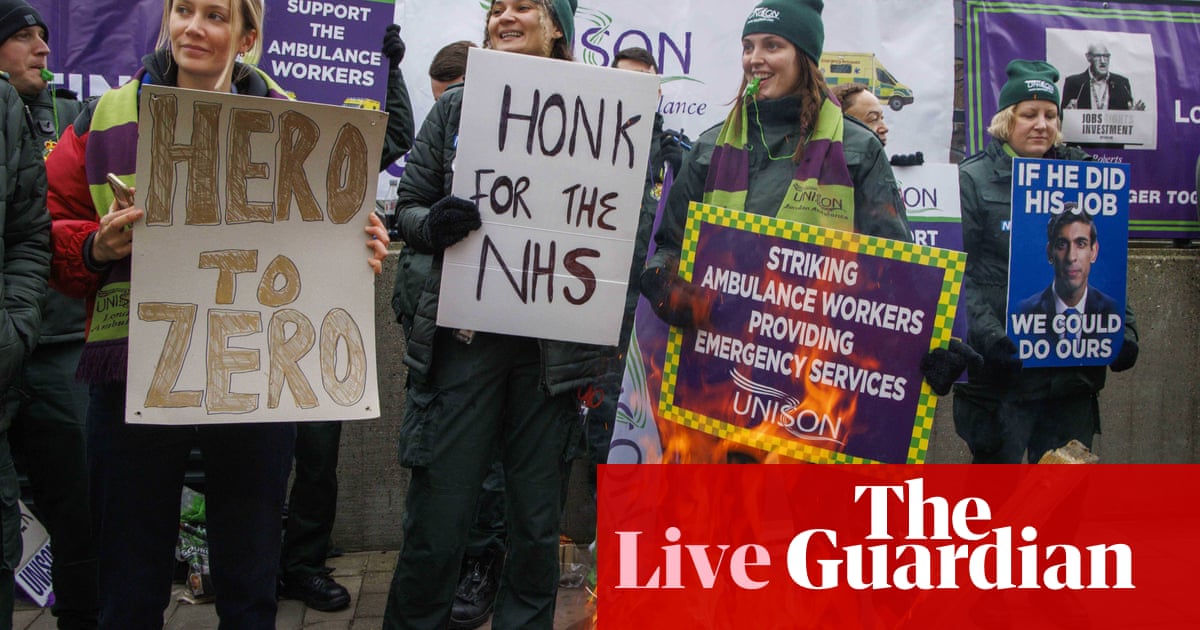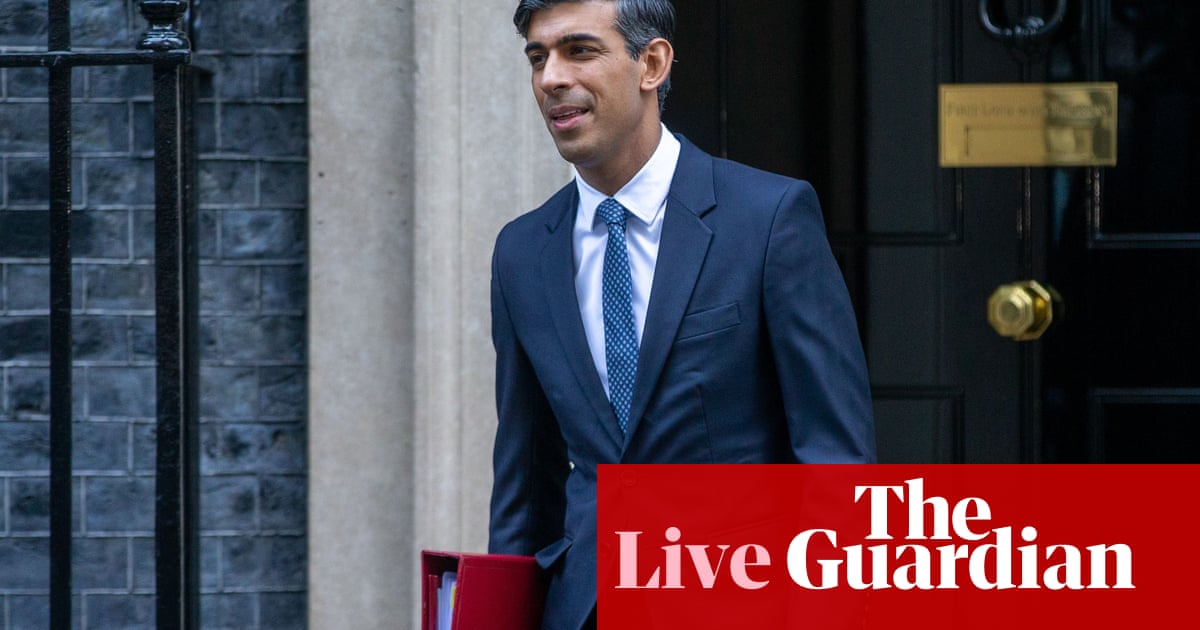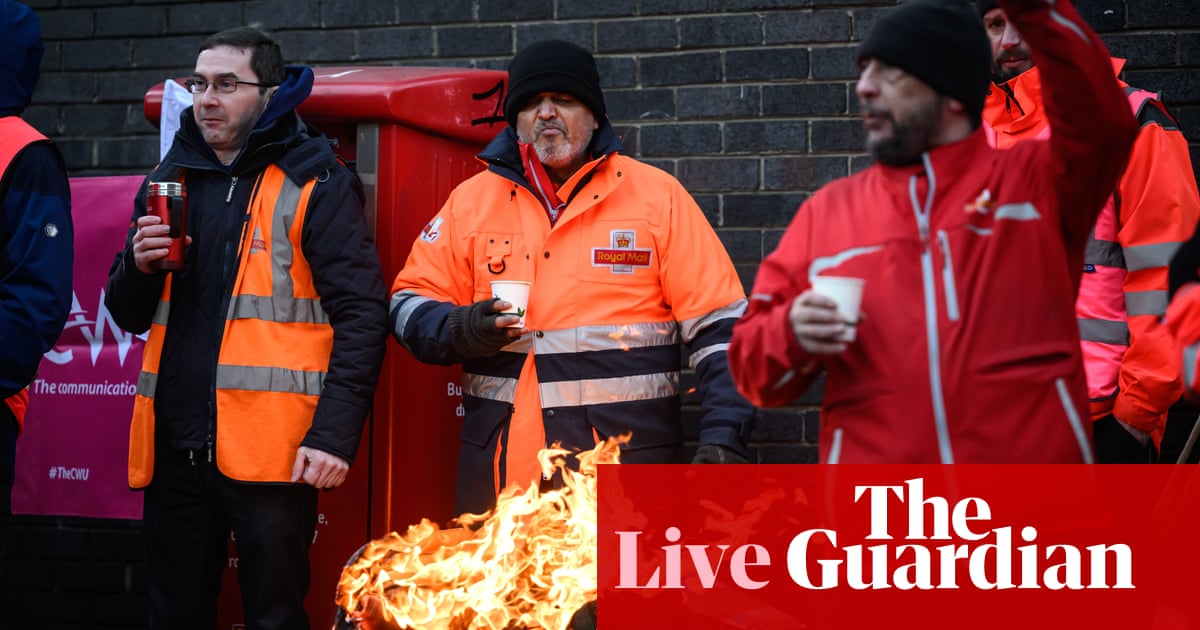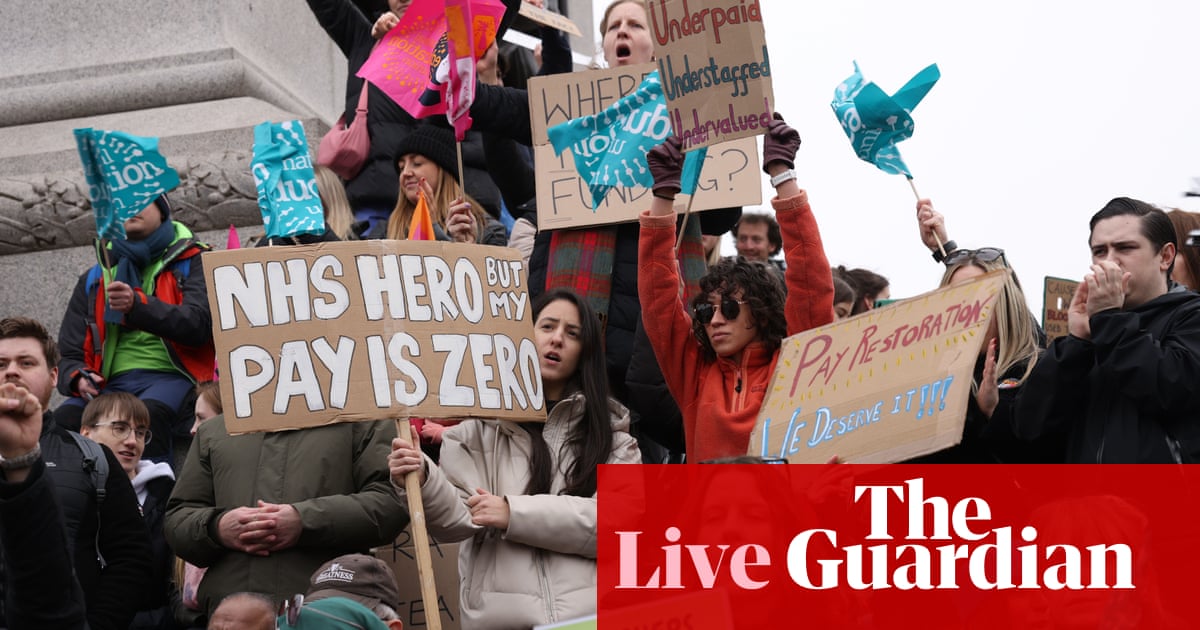
New pay offer made to NHS staff
The government has confirmed it is making a significant new pay offer to NHS staff in England, including a one-off bonus which unions say amounts to £2.5bn.
Unions involved in the pay talks said further strikes by ambulance staff and other NHS workers had been suspended and they would recommend members accept the new offer.
The government and the NHS staff council, which includes the unions, released a joint statement, which said: “Both sides believe [the offer] represents a fair and reasonable settlement that acknowledges the dedication of NHS staff, while acknowledging the wider economic pressures currently facing the UK.”
Summary
The government has confirmed it is making a significant new pay offer to NHS staff in England, including a one-off bonus, which unions say amounts to £2.5bn.
Rishi Sunak’s post-Brexit trade deal for Northern Ireland will face its first hurdle next week when MPs vote on a key part of the arrangement.
The Scottish National party is under increasing pressure to release its membership figures after two of the three candidates to replace Nicola Sturgeon as leader questioned the integrity of the ballot process, prompting accusations of “baseless smears” and “Trumpian” behaviour.
The president of the Law Society of England and Wales, Lubna Shuja, has said there is a “high chance” the government’s proposed illegal migration bill may not comply with international and domestic law.
Britain is to ban the Chinese-owned video-sharing app TikTok from ministers’ and civil servants’ mobile phones, bringing the UK in line with the US and the European Commission and reflecting deteriorating relations with Beijing.
MPs will vote on Rishi Sunak’s deal to revise the Northern Ireland protocol on Wednesdsay next week, Penny Mordaunt, the leader of the Commons, has announced.
Sinn Féin’s US fundraising arm has caused a row by calling for a referendum on Irish unity in adverts in the New York Times, Washington Post and other US publications.
Asked if he had been blocked by the Treasury from making a one-off payment offer before now, Steve Barclay, the health secretary, said decisions are taken “cross-government”.
He said: “My job is to make the case for the NHS within government.
“Of course that is something that I have been doing over recent months but we make these decisions collectively.
“I’m very pleased we’ve reached a settlement which the NHS staff council feel able to recommend to their members.”
Scrapping the tax-free cap on the lifetime pensions allowance could help to reduce the £3 billion spent per year on locum and agency staff in the NHS, the Chancellor said.
Jeremy Hunt, a former health secretary, told BBC Breakfast: “We looked at all the different options.
“The other options, if we had a scheme that was just for doctors, it would actually be more aggressive because what we’ve announced doesn’t help the very wealthiest doctors.
“It still keeps in a limit on the amount you can put in tax-free every year, but most importantly, it is something we can introduce in two weeks’ time and we can deal with a problem.
“The NHS at the moment spends about £3 billion a year paying for locum doctors and agency nurses because of these staffing shortfalls. This will help to reduce that, it will free up more resources.
“The British Medical Association, who you might imagine I’m not on their Christmas card list, has said this is potentially transformative for the NHS and it means doctors will not now leave the NHS because of the way pension taxes work, and I think that is a very important step forward.”
New pay offer made to NHS staff
The government has confirmed it is making a significant new pay offer to NHS staff in England, including a one-off bonus which unions say amounts to £2.5bn.
Unions involved in the pay talks said further strikes by ambulance staff and other NHS workers had been suspended and they would recommend members accept the new offer.
The government and the NHS staff council, which includes the unions, released a joint statement, which said: “Both sides believe [the offer] represents a fair and reasonable settlement that acknowledges the dedication of NHS staff, while acknowledging the wider economic pressures currently facing the UK.”
From the Guardian’s political editor
Rishi Sunak’s post-Brexit trade deal for Northern Ireland will face its first hurdle next week when MPs vote on a key part of the arrangement.
The full statutory instrument relating to the Stormont brake of the Windsor framework will be published on Monday before a vote in the Commons on Wednesday, the Commons leader, Penny Mordaunt, has confirmed. The mechanism will give the UK a veto over any new EU laws applying to trade in Northern Ireland.
It is not clear how the Democratic Unionist party (DUP) will vote, as the party previously said the framework did not deal with some “fundamental problems” created by existing arrangements. But the government hopes the mechanism will provide DUP MPs with enough reassurance.
Hardline Brexiters will be disappointed that they will not get a chance to vote on the Windsor framework in its entirety, but No 10 has said there will be more statutory instruments to be debated in the coming weeks.
The Scottish National party is under increasing pressure to release its membership figures after two of the three candidates to replace Nicola Sturgeon as leader questioned the integrity of the ballot process, prompting accusations of “baseless smears” and “Trumpian” behaviour.
The escalating row comes after the former junior minister and contest outlier Ash Regan called for greater transparency in how the leadership election was being run. In an open letter to the SNP chief executive officer, Peter Murrell, on Wednesday, written with the finance minister and fellow candidate Kate Forbes, the pair urged the party to release data on numbers of paid-up members, plus how many digital and postal ballots have been sent out to them.
Both candidates have also demanded an independent auditor be appointed to oversee the leadership vote.
Neil Gray, the minister running the campaign for the health secretary, Humza Yousaf, confirmed Yousaf had registered the same concerns with party managers.
Speaking to reporters after first minister’s questions on Thursday, Sturgeon told reporters she had “complete faith” in the process being used to elect her successor and insisted the membership figures would be published later on Thursday.
The president of the Law Society of England and Wales, Lubna Shuja, has said there is a “high chance” the government’s proposed illegal migration bill may not comply with international and domestic law.
The controversial bill provides the government with draconian new powers to restrict the rights of asylum seekers and trafficking victims.
Shuja has urged the UK government to reconsider its approach.
“It could lead to the British state violating fundamental rights, such as the right to life, to be protected from torture, trafficking and slavery, to liberty, to fair trial,” she said. “Tens of thousands of people would be detained indefinitely under these proposals, at great cost to the taxpayer, as there are not at this time safe third countries they could be removed to.”
The company behind the slimming jab Wegovy has been suspended from the UK’s pharmaceutical trade association after a row over sponsored weight-loss courses that promoted its medicines.
The Association of the British Pharmaceutical Industry (ABPI) said an extensive investigation by the Prescription Medicines Code of Practice Authority (PMCPA) found Novo Nordisk to be in breach of the ABPI code of practice.
The ABPI said this included a clause relating to actions “likely to bring discredit on, or reduce confidence in, the pharmaceutical industry”.
The chancellor, Jeremy Hunt, has defended plans to increase duty on Scotch whisky, despite the industry saying the rise announced in the budget breaks a previous commitment made by the UK government.
PA Media reports:
Mark Kent, the chief executive of the Scotch Whisky Association (SWA), is demanding an urgent meeting with the chancellor to discuss the impact of the changes.
He called for the duty rise to be reversed, telling Hunt: “With the right support, with a reversal of the tax rise, we are confident the industry can continue to deliver for the UK economy.”
The secretary for Scotland, Alister Jack, is said to have conceded that the rise in alcohol duty was “not what I wanted for the Scottish industry”.
Jack is reported to have lobbied the chancellor against the increase, but said that “this time the lobbying hasn’t been successful”.
However Hunt insisted the government was keeping duty levels low.
Speaking on BBC Radio Scotland’s Good Morning Scotland programme, the chancellor said: “We have been working very closely with the Scotch Whisky Association and we have frozen alcohol duty until August.”
The UK will then introduce “big reforms” to the alcohol duty system, which will mean duty is linked to the strength of the drink.
Hunt said this approach would be “beneficial to whisky distillers”, and added: “In real terms this means we will have the lowest level of duty for over 100 years, so we are keeping duty levels low.
“We will continue to engage with the industry and we want to do something that will mean they are successful and prosperous going forward.”
However in a letter to the chancellor, Kent complained about the impact the duty rise would have on “this iconic product”.
The SWA said the increase will mean taxes account for 75% of the cost of an average-priced bottle of Scotch – saying for a £15.22 bottle, £11.40 would go to HMRC through duty and VAT.
Kent told the chancellor: “The tax rise breaks the pledge made by the UK government to ‘ensure the tax system is supporting Scotch whisky’.
“This is a commitment the industry takes seriously and our member companies want to see it fulfilled.”
He said it will be the “largest duty rise since 1981”, and comes at a time when “the industry is facing significant domestic headwinds, including the soaring costs of energy”.
Kent also said a reduction in duty for drinks sold on draught would “increase the tax discrimination experienced by distillers” by “widening the gap” in tax between spirits and products such as beer and cider.
“This was a fundamental flaw in the duty reforms published by HM Treasury due to be implemented in August which we have repeatedly pointed out,” the SWA chief executive insisted.
He added that measures in the budget had compounded the problem and would mean “the new system will be a broken system, disadvantaging the Scotch whisky industry from the outset”.
The SNP MP Brendan O’Hara told the Commons: “Yesterday’s 10% increase in spirit duty is a disaster for the Scottish whisky and gin producers.”
He said the chancellor “has chosen a path which not only could destroy a hugely successful Scottish industry, but at the same time potentially kill the goose that has for so many years laid the Treasury’s golden egg”.
The UK government ignored scientific warnings from Natural England that its nature restoration target was inadequate and would not meet its commitments, documents show, undermining efforts to protect threatened species.
In December the environment secretary, Thérèse Coffey, unveiled targets at the biodiversity Cop15 in Canada to reverse the decline of nature in England. They included plans to improve the quality of marine protected areas, reduce pollution and nitrogen runoff in the river system, and restore more than half a million hectares of wildlife-rich habitat outside protected areas by 2042.
But documents obtained by Unearthed, Greenpeace’s investigative journalism unit, show that the government’s own adviser, Natural England, said ministers needed to agree a target of restoring 1.5m hectares of habitat outside existing protected sites, three times greater than the final target, if they wanted to meet a commitment to protect 30% of land and sea. They went on to suggest a minimum target of 750,000 hectares.
UK bans TikTok from government mobile phones
Britain is to ban the Chinese-owned video-sharing app TikTok from ministers’ and civil servants’ mobile phones, bringing the UK in line with the US and the European Commission and reflecting deteriorating relations with Beijing, my colleague Dan Sabbagh reports.
MPs to vote on Northern Ireland protocol deal on Wednesday next week, Mordaunt says
MPs will vote on Rishi Sunak’s deal to revise the Northern Ireland protocol on Wednesdsay next week, Penny Mordaunt, the leader of the Commons, has announced.
She told MPs at business questions:
On Wednesday March 22 a debate [will take place] on a motion to approve a statutory instrument relating to the Stormont brake in the Windsor framework.
At one point No 10 was wary of scheduling a vote on the deal because Sunak was nervous about a backlash against it from Brexiter Tories and the DUP. But the DUP has said it will take its time before coming to a considered view on the deal, and most Conservatives, including hardline Brexiters, have backed the agreement.
One Tory who has criticised it at length is the former PM Boris Johnson. But on Wednesday afternoon next week he will be otherwise engaged, giving evidence to the Commons privileges committee about the claims that he misled MPs about Partygate.
Tony Blair tells MPs resumption of power sharing would be best way for DUP to help preserve union
Kiran Stacey
Tony Blair was in parliament today to talk to the Northern Ireland committee about the Good Friday agreement and the Windsor framework.
The questions from members of the committee were a mixture of fawning praise and attempts to settle old scores stemming from the Good Friday negotiations. But the most interesting parts were what he said about the current impasse in Belfast, where Stormont has been suspended for over a year .
Blair praised the government’s agreement with the EU to replace the Northern Ireland protocol with the Windsor framework, telling the committee that it is the best practical solution to the border issues that were caused by Brexit. He said:
My reason for supporting what the government has done, what this prime minister has done, on the Windsor agreement is I think it represents the most practical way forward that minimises all the theoretical objections.
He also urged the DUP, two of whose MPs were present, to rejoin power sharing.
If you want to preserve the union today, the best way of doing it is to recognise the status quo is the union, so make people comfortable with the status quo.
Then it was time to depart - but not before a quick stop to allow two members of the committee – the SDLP MP Claire Hanna and the Labour MP Mary Kelly Foy – to take selfies.
Health workers expected to be offered one-off payments worth up to 6% as part of revised pay offer
Steve Barclay, the health secretary, is expected to announce a formal pay offer to key unions involved in NHS strikes in England, including a one-off payment of up to 6% for this year, in an effort to end months of industrial action.
Last-minute talks between the Department of Health and Social Care (DHSC) and the unions were understood to be continuing on Thursday morning, but an offer was expected to be made public later in the day.
Two sources suggested it would include an across-the-board payment of up to 6% for 2022-23, and then a permanent pay increase of about 5% for the coming financial year – significantly more than the 3.5% the Treasury had initially suggested was affordable. The payment for this year is expected to be split into two parts – a 2% one-off pay award, and a 4% “Covid recovery bonus”.
With inflation expected to fall sharply in the coming months, 5% is highly likely to amount to an above-inflation rise. Ministers had previously said they could not reopen the current year’s pay deal, under which many NHS workers received a flat-rate £1,400 increase.
The chancellor, Jeremy Hunt, said in his budget statement yesterday: “High inflation is the root cause of the strikes we have seen in recent months. We will continue to work hard to settle these disputes but only in a way that does not fuel inflation.”
Members of the unions involved, which represent ambulance workers and physiotherapists as well as nurses, would have to approve any offer in a consultation before the strikes could be permanently called off.
The Royal College of Nursing (RCN), which began historic strike action in December, was the first union to decide to suspend industrial action and enter “intensive” negotiations with the government last month. Other unions, including Unison, the GMB and Unite, whose members are part of the same bargaining unit as nurses – known as Agenda for Change – agreed to discussions a few days later. At the time, they were reassured any new offer would involve new money and not have to be funded from existing NHS resources.
The government hopes settling the NHS dispute will be the first step to resolving the waves of industrial action that have hit public services, including education and much of the civil service, from Border Force staff to driving instructors.
It is understood some of the final sticking points in the talks included whether the lowest paid would be given a more substantial uplift.
Some unions had been concerned that the government might try to do a separate deal with the RCN, breaking up the Agenda for Change bargaining unit – but Barclay’s offer is expected to apply to all the hundreds of thousands of workers covered.






